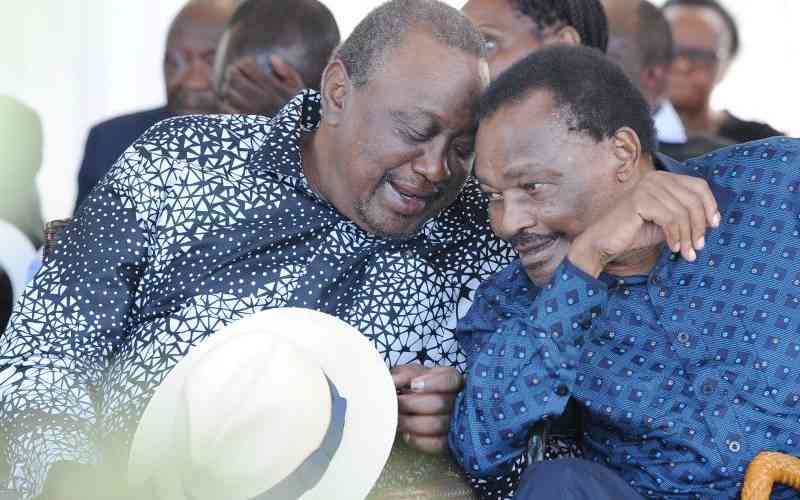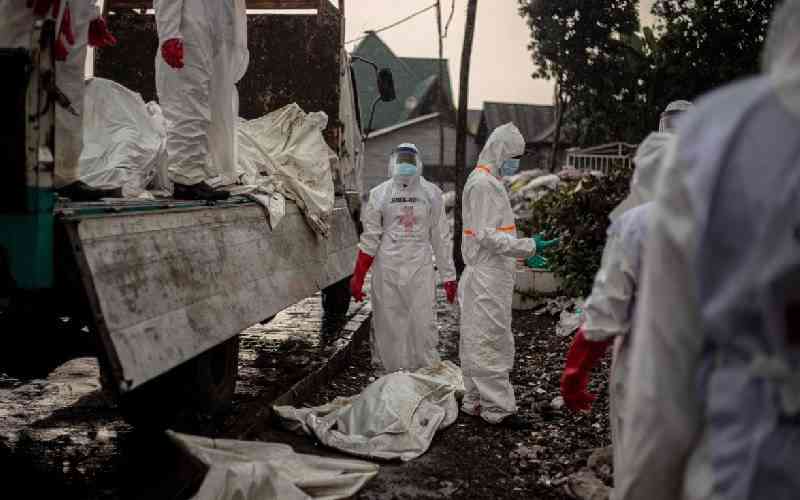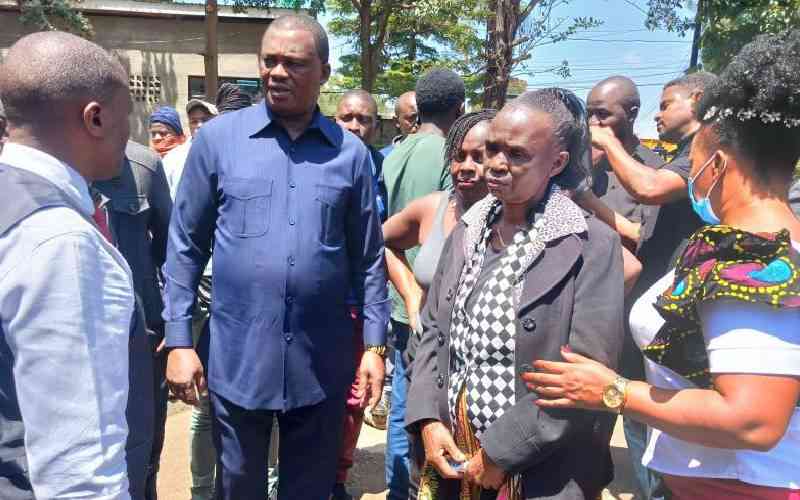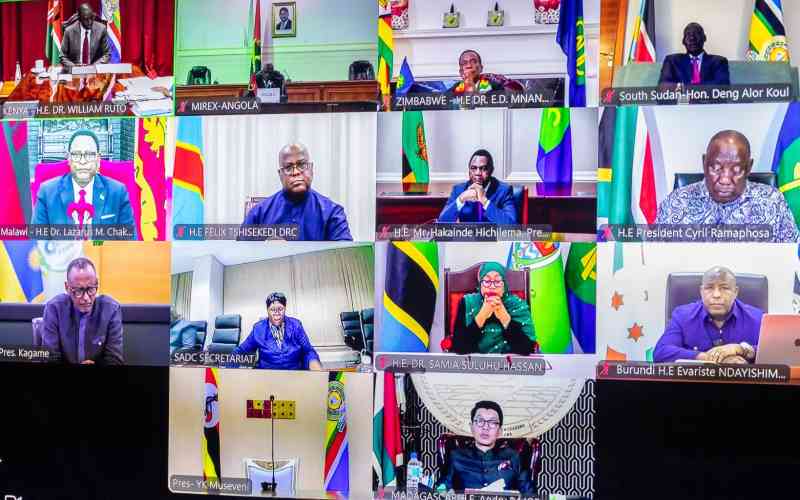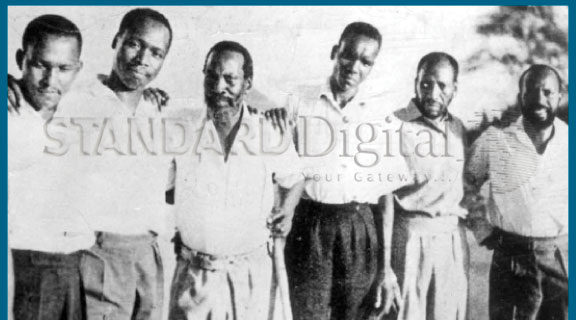 |
|
Kenya’s first president, the late Jomo Kenyatta (third from left) with his co-accused during the famous Kapenguria trials before independence. His son, Kenya’s fourth president Uhuru Kenyatta is facing charges of crimes against humanity at the ICC, The Hague. [PHOTO: FILE] |
By MUNENE KAMAU and ERIC WAINAINA
As the trials of Kenya’s president and his deputy unfold at The Hague, central Kenya residents say they are amazed at the case’s similarity with one that took place 61 years ago.
Elders who lived through the trial of Jomo Kenyatta, President Uhuru Kenyatta’s father, which was held in a remote makeshift court in Kapenguria, say they are amazed at the similarities between the predicament facing father and son, six decades apart.
They recalled how the whole of Mt Kenya region, like the rest of the country, was plunged into darkness and despair when Kenyatta was arrested on the night of October 20, 1952.
“There was a dark cloud hanging over the country. People talked in whispers. Although I was only six years old, I could sense the fear and desperation hanging on our land,” Isack Kimani recalls.
Gitu Kahengeri, Mau Mau War Veterans Association chairman, says during the trials, unlike today when Kenyans are watching streamed videos from The Hague, they had to wait to get an update of the matter from the defence lawyers.
“There was a lot of security and you could not attend the court. We were not even allowed to go past Nakuru so we would wait for the lawyers to come back and inform us of the last hearing,” he explains.
To many in the region, The Hague today is like Kapenguria then, for it is not accessible to ordinary people.
At that time, Kahengeri says Kenyatta did not have enough money to pay for good lawyers to defend him in the case.
“We were contributing money and some would give 5 cents, others 10 cents to pay for good lawyers. Kenyans portrayed a lot of solidarity just like they have done with his son,” says the independence war veteran.
Voted for a suspect
But despite the tag given to Kenyatta as a leader unto death and darkness by colonial judge Thacker, Kenyans still elected him in absentia.
This, Kahengeri says, happened to Uhuru too, who was elected president despite the crimes against humanity charges preferred against him at The Hague.
“They voted for him knowing he is a suspect because they believe he is innocent just like we did not believe that Kenyatta was a criminal,” Kahengeri says.
“We are lucky now that we can actually monitor the proceedings live from The Hague on television. People who had access to the lawyer representing Kenyatta would communicate the proceedings, which spread throughout Kenya,” Kimani adds.
Stay informed. Subscribe to our newsletter
However, loyalists who had radios monitored the proceedings from the comfort of their sitting rooms.
But just like some Kenyans today want Uhuru to continue being tried at The Hague and even wish he is found guilty, there were those who wanted Kenyatta to be jailed for long.
“One chief, Njiiri wa Kigo from Location Three, now known as Ruchu in Kandara, Murang’a County, was overjoyed when Kenyatta was convicted,” says Kahengeri.
Kigo, one of the few who had access to a radio was, however, outraged when the same radio later announced that Kenyatta would be released.
Kenyatta family
“Kenya gaka githi ndwanjirire ati Kenyatta ndakoima njera na riu wandira magego at ni ararekio.”
(You damn thing! Are you not the one who told me that Kenyatta would rot in jail and now you have the guts to tell me he will be released?”), thundered Kigo as he whacked his transistor radio.
And to the Kenyatta family, the prosecution of the former president’s son Uhuru is too great a pain to bear.
In April 2011, Ngengi Muigai, a close relative of Uhuru drew parallels between his charges at the ICC and the trial, jailing and unlawful detention of his father by the British colonial government.
“How much can a wife and a mother bear? Her (Mama Ngina’s) husband’s tribulations from the British colonialists and now her son from the neo-colonialists!” said Ngengi.
Mama Ngina had said at the same venue: “I’m sure Uhuru, Ruto and the rest will go to The Hague and come back so that we can proceed with nation building.”
She said this on the day she laid hands on both her son and Ruto as she prayed for their safe return from The Hague.
She said the charges facing her son and his co-suspects were the work of neo-colonialists and urged Kenyans to stand by Uhuru and resist just like they had resisted the British colonial rule.
“The colonialists gave us problems and it is now clear they have never relented,” said the former First Lady.
She said one day the truth behind the 2007 post-election violence would come out.
“Whatever is done in the dark will come to light,” she said.
Kenyatta was arrested in October and indicted with five others on charges of “managing and being a member” of the Mau Mau, a radical anti-colonial movement engaged in the rebellion.
Six suspects
His co-accused were Bildad Kaggia, Kung’u Karumba, Fred Kubai, Paul Ngei, and Achieng’ Oneko, who were to be known as the Kapenguria Six.
Like in the Kapenguria trial, the ICC case indicted six suspects as the brains behind the turmoil which rocked the country in 2008.
The script almost reads the same when former International Criminal Court Prosecutor Luis Moreno-Ocampo named five other suspects alongside Uhuru in 2011.
The number of persons facing ICC charges have now reduced to three after the court dismissed the allegations against the others.
 The Standard Group Plc is a
multi-media organization with investments in media platforms spanning newspaper
print operations, television, radio broadcasting, digital and online services. The
Standard Group is recognized as a leading multi-media house in Kenya with a key
influence in matters of national and international interest.
The Standard Group Plc is a
multi-media organization with investments in media platforms spanning newspaper
print operations, television, radio broadcasting, digital and online services. The
Standard Group is recognized as a leading multi-media house in Kenya with a key
influence in matters of national and international interest.
 The Standard Group Plc is a
multi-media organization with investments in media platforms spanning newspaper
print operations, television, radio broadcasting, digital and online services. The
Standard Group is recognized as a leading multi-media house in Kenya with a key
influence in matters of national and international interest.
The Standard Group Plc is a
multi-media organization with investments in media platforms spanning newspaper
print operations, television, radio broadcasting, digital and online services. The
Standard Group is recognized as a leading multi-media house in Kenya with a key
influence in matters of national and international interest.


